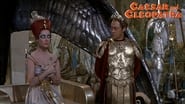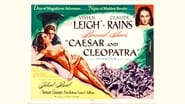Fluentiama
Perfect cast and a good story
Spoonatects
Am i the only one who thinks........Average?
Kaydan Christian
A terrific literary drama and character piece that shows how the process of creating art can be seen differently by those doing it and those looking at it from the outside.
romanorum1
In advance of his relatively small Roman forces, the aging Julius Caesar (Claude Rains) is fresh from his victory over political rival Pompey. At the Sphinx he meets the unwary and naïve Cleopatra (Vivian Leigh, a decade older than Cleopatra was at the time). Although he playfully toys with her superstitious nature, he is never malicious. She acts like a frightened child, and does not even know how to command her slaves, especially Ftatateeta (Flora Robson). Caesar gives her a guiding hand on ruling her subjects. "Is it sweet or bitter to be a queen?" he asks. "Bitter" she replies. Soon the small Roman force (less than one legion) arrives and hails Caesar. "Don't eat me," she exclaims to him. He tells Cleopatra not to fear, as he is a reasonable man. Later, at the Egyptian court in Alexandria the capital, and surrounded by enemies, he speaks clearly but also in double entendres. Caesar does not reveal what he is thinking. Competing for the throne are sister (Cleopatra) and much younger brother Ptolemy (Anthony Harvey). As was the case in Egypt, brother and sister are also married (considered abhorrent by Romans). Ptolemy says that as soon as he is older, he will execute his older sister. Caesar's temporary decision is to have brother and sister jointly rule. He also says that he needs money, some 16,000 talents; he is told that the treasury is empty. At any rate, in such a treacherous atmosphere, one has to be on his/her toes. And it was really this way. Although Pompey had aided Egypt in his early campaigns, the Egyptians rewarded his request for sanctuary by murdering him before he was even ashore. An especially wicked court adviser is the eunuch Pothinus (Francis L. Sullivan). The scholar Theodotus (Ernest Thesiger) is treacherous. The Egyptian general, Achillas, is untrustworthy. All three were involved in the assassination of Pompey although the actual deed was done by Lucius Septimius (Raymond Lovell). Nevertheless, Caesar eventually allows the entire court to leave, an action that leaves his second-in-command Rufio (Basil Sydney) baffled. Michael Rennie is one of the Roman centurions. Young Stewart Granger plays a flamboyant Apollodorus, the Sicilian who helps deliver Cleopatra to Caesar. Britannus (Cecil Parker), from far away Britain that is not yet a Roman possession, is obviously in the script as an agent to give playwright Shaw a chance to get in some points for his homeland. The Romans manage to hang on to the palace grounds but are greatly outnumbered by Achillas' Egyptian army that has occupied most of Alexandria. At one point Caesar has to dive into the harbor and swim away to safety (historically accurate). In the fighting the fleet in Alexandria Harbor is set afire, which spreads to the famous library and destroys most of the old manuscripts. The scene where Cleopatra wraps herself in a carpet that is delivered safely to Caesar by Apollodorus is historically accurate also (although it happened earlier, and not later at the Pharos lighthouse). After the main Roman army in the East arrives they eventually defeat the Egyptians. Cleopatra, who has morphed from adolescent to a foxy manipulator, is now sole ruler of Egypt. As Caesar departs for Rome, he promises her that he will send one of his best generals, and one she has admired for a long time: Mark Antony.The film features terrific production values and costumes. The acting is great, as one would expect from such a production, and there is snappy and witty dialogue. Notice that in the opening credits, each of the U letters is converted to a letter V. Note that the Romans carved the letter V instead of U on marble, as V was used as U in Classical Latin. (Over time, usage changed.) Also, as it is difficult to carve smaller curves with a chisel, they were often avoided. So a letter C may appear as a sideways V (<). Postscript: The movie, produced on sound-stages, is based on Shaw's play, so it cannot be historical, although many pictured events did really happen. Cleopatra was educated and savvy enough to know her royal role, even before Caesar arrived. The film does not cover later incidents, such as the birth of Caesarion (the son of Caesar and Cleopatra), her trip to Rome, Caesar's rule, and his subsequent assassination. Caesar was never a murderous leader. Untraditional in his rule, he was wise and compassionate. Ironically, Caesar's benevolence and clemency – his forgiving of many enemies ("clementia") – led to his undoing. He left so many adversaries in the Roman Senate that they banded together and did their terrible deed on the Ides of March in 44 BC.
Neil Doyle
Even the presence of two great performers cannot save CAESAR AND CLEOPATRA from sheer boredom. The fault, of course, lies in the George Bernard Shaw play on which the film is based. The early scenes involving LEO GENN and the scene showing CLAUDE RAINS' first encounter with Cleopatra are so badly staged, written and directed that a viewer like myself cannot even get involved in caring about the characters.VIVIEN LEIGH prances around like an airhead girl without any sense of decorum or wisdom, making her an unlikely candidate to become Queen of the Nile. Furthermore, her illness shows in every close-up and the eye make-up and white skin is hardly how one visualizes the woman who would later seduce Mark Antony.CLAUDE RAINS is an impressive Caesar, but his fawning over the childish woman he first encounters (on a sound stage in a fake desert) becomes intolerable after awhile. Vivien seems like a spoiled brat undeserving the sort of attention reaped on her.But the biggest distraction is that it is obvious all of the outdoor scenes are taking place on studio sets, given that the film was made when Britain was still being bombarded with air attacks during WWII. The color print shown on TCM is a bit garish but does indicate that a lot of expense went into costumes and settings. Too bad all this money couldn't have been lavished on a better script. As Shaw, who penned the script, has Liza say in "My Fair Lady,": "I get words, words, words!"FLORA ROBSON is a bit hard to take in an offbeat role and most of the supporting names in the large cast are wasted, with the exception of STEWART GRANGER.Summing up: Not cinematic. Never overcomes its stage origins.
rajah524-3
Shaw's hardly a speck on the windshield of American cultural consciousness anymore. Too bad. "The Devil's Disciple," "Major Barbara," "Arms and the Man," "Candida," "You Never Can Tell." Witty, clever, insightful, intriguing... a century and more later.For those who haven't discovered him yet, this colorful, fast-paced rendition of "C&C" makes a nifty portal. The film -looks- like "Quo Vadis" or "Samson and Delilah" (of more or less the same vintage). It even looks like the Taylor-Burton-Harrison marathon done almost two decades later.But it doesn't -feel- like -any- of those. Shaw always had a great story to tell -- and a something worthwhile to -say- -- and he (or his characters) almost invariably told and said it well. One could hardly call the 1934 or 1963 films "insightful romps." This, however...I've been a sucker for Vivien Leigh since I watched her whip the boys into shape in "GWTW," but as interesting as she was there, she's miles beyond Scarlet O'Hara here. Shaw gave -his- Cleo a far more complex character than Young or Mankiewicz gave their Cleo's; this alabaster Leigh is both adolescent and guileful. But to Rains's conflicted but self-suspect Caesar, she's about as transparent as that look-alike, late-night, hottie-cum-biblical-scholar who inherited Gene Scott's TV ministry.The relationships here are no different from those in the Mankiewicz mess, but they move along in far more sophisticated -- and entertaining -- fashion here. We already know the resolution, it's the unfolding of the drama that matters. Rains ("Casablanca," "The Invisible Man") and Leigh bring the wise, amused, self-effacing old man and the desperate, manipulative, narcissistic young woman in Shaw's play far more credibly to life than was the case in the DeMille or Manciewicz films. And supporters like Robson, Granger and the rest add plenty. But as in any Shaw play, it's the playwright's sophisticated revelations that matter.The "big success" narcissist who thinks a "trophy wife" is a good idea might learn plenty from a trip to Blockbuster and a two-dollar investment.
blanche-2
Impressive acting is the highlight of 1945's "Caesar and Cleopatra," a British production starring Vivien Leigh, Claude Rains, Stewart Granger, Flora Robson and Francis L. Sullivan. In smaller roles, you can spot Michael Rennie, Kay Kendall and Jean Simmons.This production was not without its problems - made during World War II, bombings often delayed the filming; there was a five-week break while Vivien Leigh recovered from a miscarriage; and there was a shortage of materials to build the sets. Nevertheless, for a British film, this is a real spectacle and made in color, which was also unusual back then.Shaw's Cleopatra (Leigh) is a childlike girl/woman who has hitting matches with her younger brother, runs, giggles, talks fast and becomes nervous at the thought of meeting the great Caesar (Rains). In the beginning, she meets him without realizing it. The two have a flirtation while he teaches her how to be a queen. Shaw's Caesar is an old man, a great warrior and a benevolent ruler who rules with a velvet glove rather than a sword.Rains and Leigh are wonderful in their roles. Rains, as someone stated, with his Caesar haircut, weary face and beautiful profile looks as if he stepped out of that time period. His mastery of Shaw's language is magnificent, and he really holds the film together.The stunningly beautiful Leigh, white-faced with glorious cheekbones and dazzling eyes, is a whimsical Cleopatra at first. She matures and becomes calmer and more regal as she learns how to be a queen, but she falls back into her childish ways in the presence of Caesar, particularly when he promises to send her Marc Anthony. They say the camera adds 10 pounds - frankly, I'm surprised any of the actors could see Leigh, she is so tiny. She gives a sprightly, energetic performance. Shaw's Cleopatra is 16 (though in reality she is 20 or 21) - Leigh was 32 at the time of filming and comes off like the teenager Shaw wrote.Stewart Granger as Apollodorus shows off his very hunky physique - no wonder he came to the attention of Hollywood. As two aides of Caesar's, Basil Sydney as Ruffio and Cecil Parker as Britanus give fine performances. Finally, Flora Robson as the protective, tough nursemaid of Cleopatra's, Ftatateeta, sinks her teeth into the role and is a force to contend with.This movie flopped, probably because audiences thought it was going to be some huge spectacle - it's big for England, but it's not DeMille. Still, it's a real treat to see one of the classics done by two great actors who were well-trained and well-equipped to perform George Bernard Shaw.




